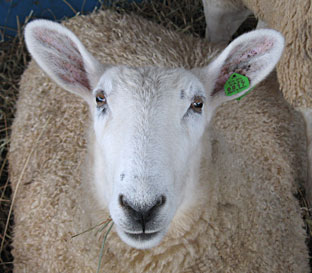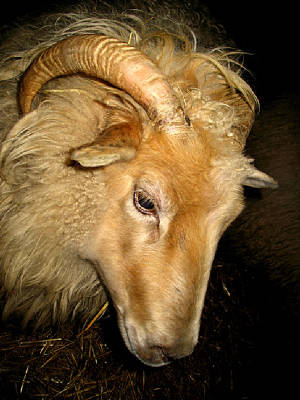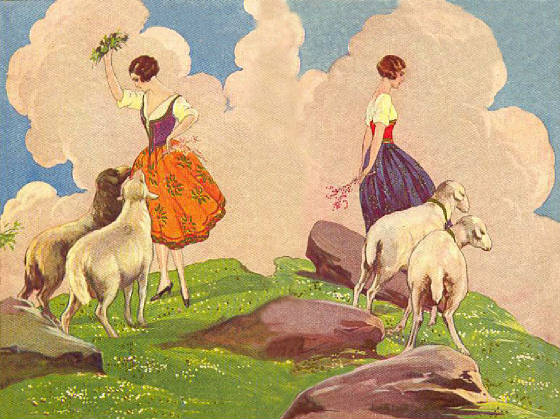|
Sheep have an incredibly deep genetic diversity. The wild sheep still roam the mountains
in a great arc across North America into Asia. And there is an amazing variety of sheep among the over 700 different breeds
of domestic sheep spread all over the world. Sheep were given by God as companions to humans and this relationship is beneficial
to both. Sheep are a real treasure because they can be molded, by selective breeding, into a wide variety of types that fulfill
a wide variety of human needs. Sheep have been developed that do well in all the different climates of the world and that
produce different products that benefit people. Our personal interest is in developing sheep that are affectionate toward
people. We like to envision the possibility that sheep can live on farms with people in a close social relationship much like
the relationship between people and dogs.

Do sheep have a soul? When they look up at me with that clear look of understanding and recognition, I feel like they
do. But how would we know? Only God knows for sure.
People eat sheep meat as a matter of course. The surplus lambs, particularly the surplus males, are routinely slaughtered
for the table. This is life. But it is an aspect of life that is very difficult for some people to understand. They ask, how
can you love sheep and still eat them?
Particularly it is city people, who usually eat meat themselves but are separated from the processes of producing it, who
are baffled by this question. So to address the question we will offer separate answers for the farmer and for the city dweller.
The farmer, who cannot escape the realities of nature, knows intuitively that he or she cannot keep all the sheep that
are born on the farm. It is physically impossible and economically impossible. There is a limit to the carrying capacity of
any farm. Excess animals must be put to use. And even the hobby farmer feels better when there is an economic return for the
work and expense invested.
For the city person to understand this issue of eating sheep, it helps to see sheep in terms of populations rather than
individuals. Over the centuries sheep and people have lived together in relationships that were beneficial to both. Each providing
the other with the necessities of life. In more primitive times sheep would have quickly disappeared if they had not been
beneficial to humans. And even today the large numbers and variety of sheep on the planet are possible because they are of
economic benefit to their keepers. So sheep populations owe their existence to people. They pay their way by providing meat
and wool. In turn, sheep populations thrive and individual sheep are given a chance to live a life. It is a mutual trade that
has endured the test of time.
The bottom line is that God has given sheep to humans to be our companions and to provide us with things we need to
maintain this body we live in. That is His purpose for sheep. Our responsibility is to give the sheep a quality life wherein
it is treated humanely and with respect. If this rule is followed then eating the sheep is right and good and fulfills the
obligation of each to the other.
|
 |
|

The beauty of sheep goes largely unrecognized in our helter-skelter fast paced world.
|
 |
|
Sheep supported people through the disappointments and trials of early life on
this beautiful, but sometimes harsh, planet. During the hard times of human existence sheep were with us. But in our highly
technological world it is the sheep who have fallen on hard times. The wild sheep are often starved on winter ranges that
have been overgrazed by domestic livestock. And they are often exploited by hunting practices that selectively kill the genetically
superior rams. In recent times it has been necessary to step up and defend sheep in a society that has largely forgotten that
sheep have been our companions since the beginning of human societies and will be our companions again in the difficult times
that are coming upon us.


When we celebrate life, sheep join us. Because our life is their life. The wild sheep are preserved for us in the wild
mountains in case we ever need a source for more sheep. The domestic sheep have made their home with us. We serve them by
providing them with a quality life. They serve us by providing us with meat , milk, and wool.
|
|